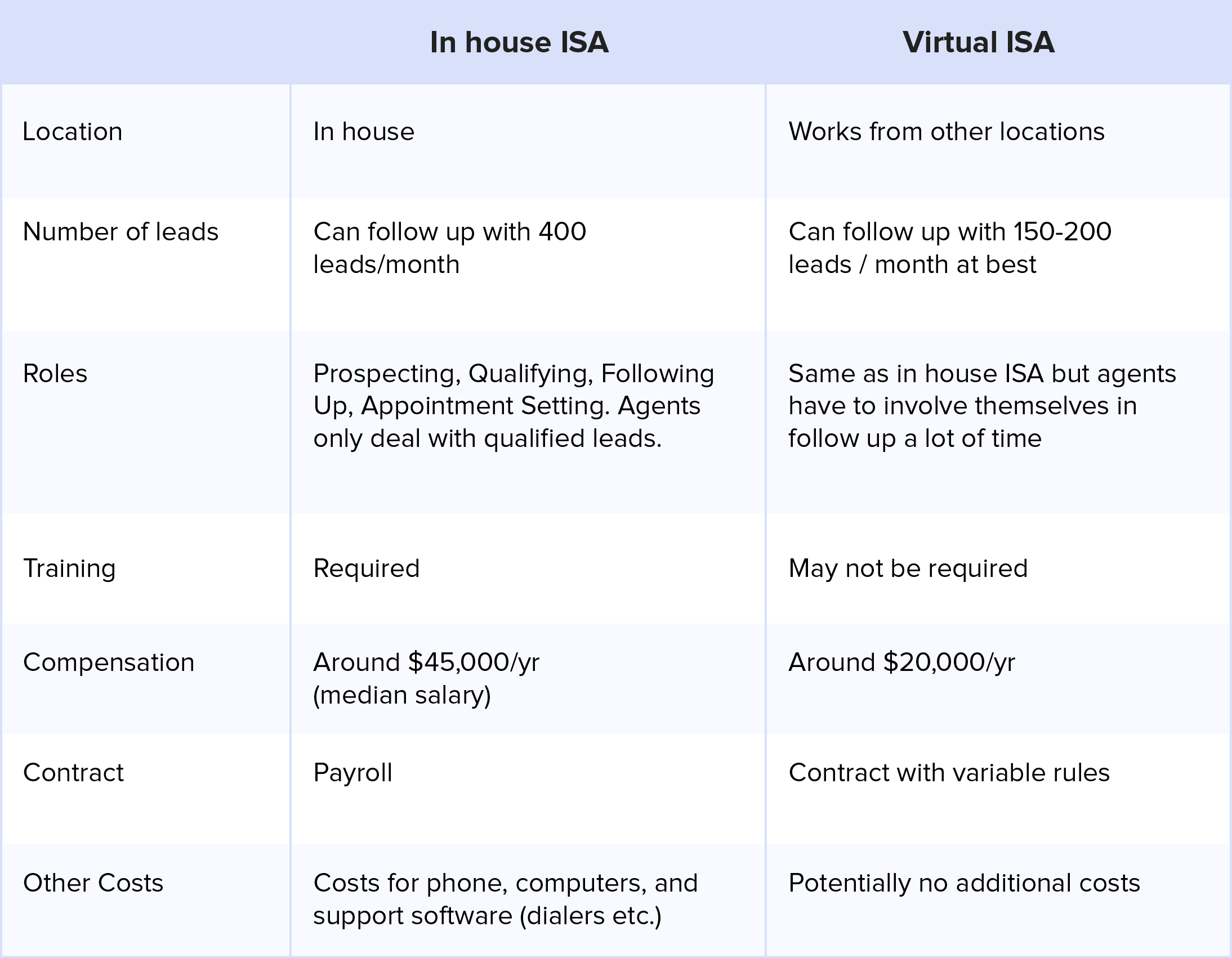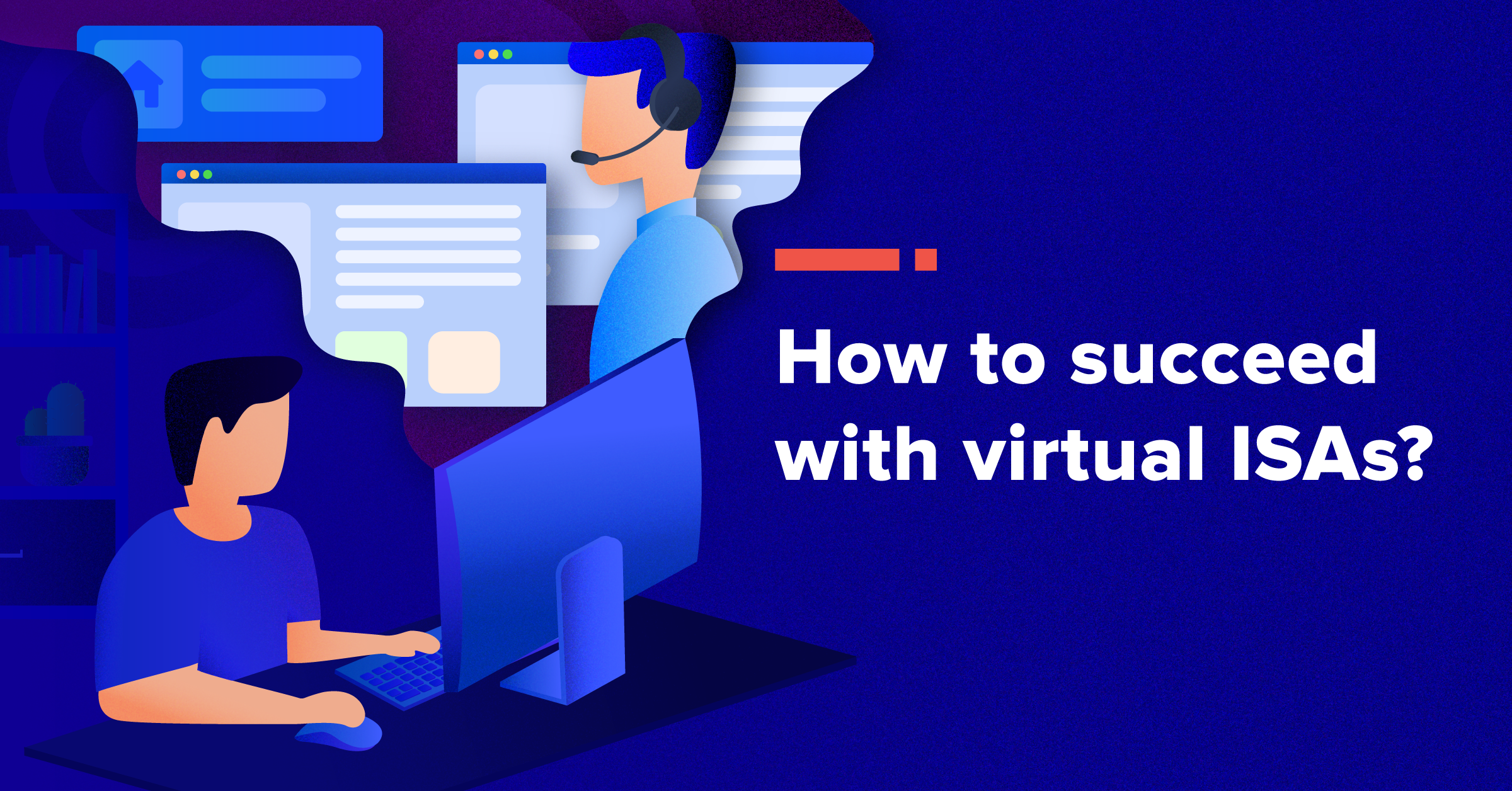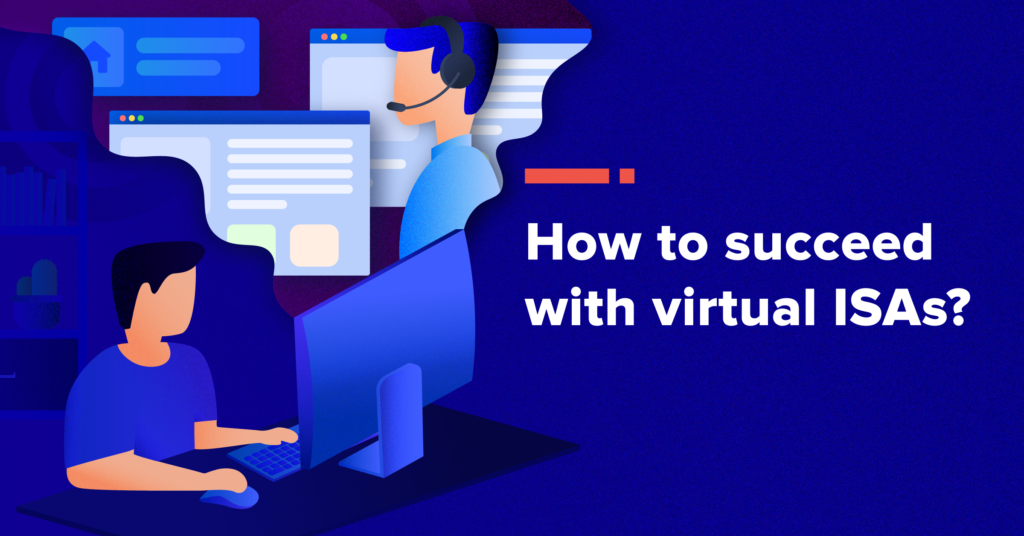
Confused between hiring in house and Virtual ISAs? Read this post to learn why virtual ISAs matter and how you can succeed by hiring one.
ISAs are integral to any real estate business. For a lot of agents, they literally become the workhorses who drive revenue by prospecting for potential leads, qualifying incoming leads, and nurturing past clients for referral and repeat business.
Despite this, a lot of agents are averse to, or even nervous about bringing another person on board and paying them a fixed salary. A lot of them see hiring an ISA as an expense instead of as an investment. If you are one of them, what should you do? The answer could be virtual ISAs.
What are virtual ISAs?
Virtual ISAs are people who are hired on a contract basis from freelancing websites or virtual ISA companies for prospecting, qualifying, and following up with leads.
In other words, a virtual ISA performs all the tasks an in house ISA does, without being physically present in your office and working under your payroll.
While it is easy to hire a virtual ISA, you may not get the desired performance as compared to an in house ISA due to a number of reasons. What are those reasons and how do you avoid them? How to be successful with your virtual ISA? This post is going to answer those questions!
However, before we suggest solutions, it is important to understand the differences between in house ISAs and virtual ISAs as the solutions will come out of that.
What is the difference between in house ISAs and Virtual ISAs?

You can see that hiring a virtual ISA has got a lot of positive aspects compared to in house ISAs.
In essence, virtual ISAs give agents a lot of flexibility with hiring and firing if things do not go as planned. From a general perspective, virtual ISAs are useful when your lead volume is on the lower side and you are unsure about whether you want to build an ISA team or not.
In addition, agents who step into the growth phase of their career are uncertain about their future. They cannot yet picture their ISA team and the sales workflow they intend to build for the next phase of their business. This is why they tend to go with something that does not come with many strings attached.
Summing up, you should hire virtual ISAs when
- You do not have more than 100 to 150 leads to qualify every month
- You want to increase your speed to lead for evening leads
- You cannot foresee how in house ISAs could help you in sales development
- You do not want to take care of payroll and other HR responsibilities
- You do not have or have a small office space
- You do not want to incur fixed costs of salary and equipment
Now that you know when should you go with a virtual ISA instead, it is time to prepare and list out some important things to ensure success working with virtual ISAs.
How to ensure success working with Virtual ISAs?
Have a plan and tentative sales development workflow
One of the pretexts of hiring virtual ISAs is the inability of agents to conceptualize the sales development workflow. While a lot of agents hire 9-to-5 ISAs (ie. ISAs that work only during business hours), data shows that it is not the best approach to set up your sales development workflow.
You may not know this, but a lot of real estate leads come in outside of business hours which is why you need ISAs working on those early morning and evening time slots to qualify your real estate leads. If you aren’t able to handle morning and evening leads, your chances of converting leads are likely to be slim.
In order to accomplish that, decide which time slots you want your ISA or ISAs to work. Most virtual real estate ISA companies provide ISAs for the morning, evening, and night shifts. Hence, you can hire one or more virtual ISAs to fill your desired shifts.
If possible, we recommend hiring two virtual ISAs instead of one, with one working during the morning hours and the other during the evening.
Have the job description and roles ready
The job description and responsibilities of an ISA are almost the same as that of a virtual ISA. However, to increase the effectiveness of the hire, you must focus on their personality and map it to the respective requirements of lead follow up, prospecting and lead qualification.
Set Goals for your virtual ISA
Goal setting could be done with respect to various performance metrics such as the number of calls to qualified leads, per lead call attempts etc. If your virtual ISA is taking care of drip campaigns as well, you may want to see the average number of qualified leads for drip campaigns they are running.
Onboarding, Coaching, and Rewards
One of the disadvantages with virtual ISA is the fact that they are likely to have some amount of disconnect with the brand unlike in house ISAs. This could make virtual ISAs treat your tasks as to-dos instead of responsibilities or goals.
In order to avoid that, you should conduct an onboarding session and coach them appropriately about your business model and unique offerings, and arm them with relevant lead contact and qualification scripts so they feel a sense of ownership over your business and work.
You should also try to reward your virtual ISAs with a bonus when they help you convert a lead into a customer!
Conclusion
In house ISAs and virtual ISAs have a lot in common. While agents aspire to hire in house ISAs eventually, the process of hiring a full time in house ISA can be a bit overwhelming for many. In such cases, virtual ISAs can be a viable and effective alternative. However, in order to succeed with virtual ISAs, you need to be clear about your priorities and do your homework before you bring them onboard.
 Aiva
Aiva





